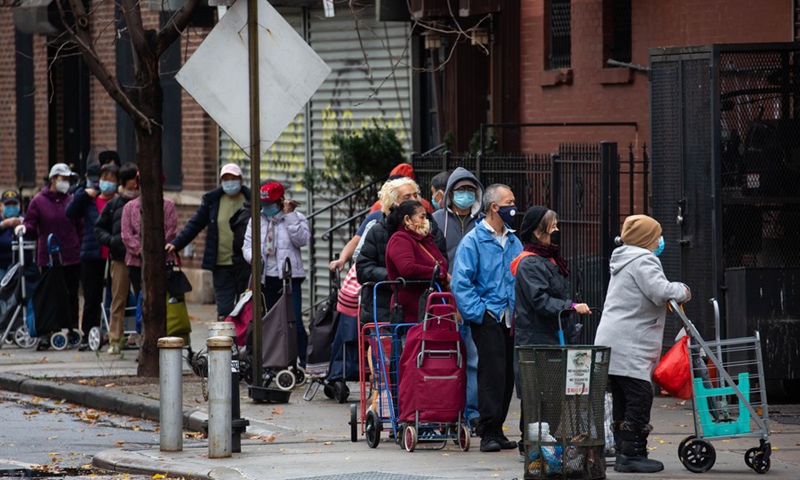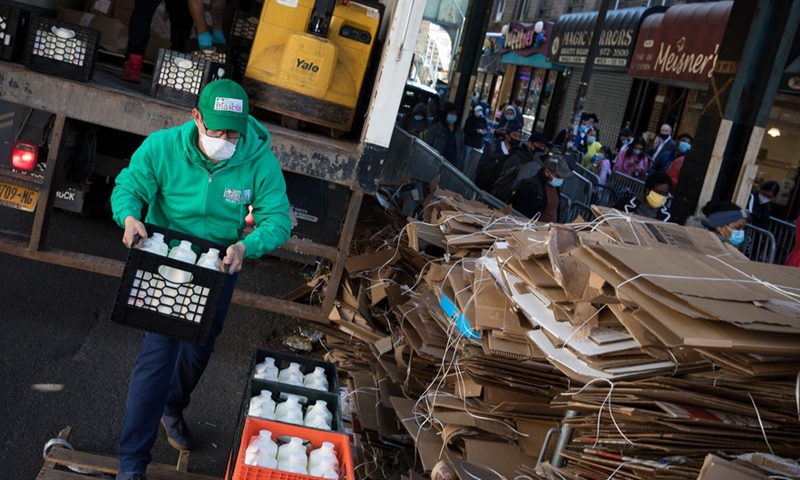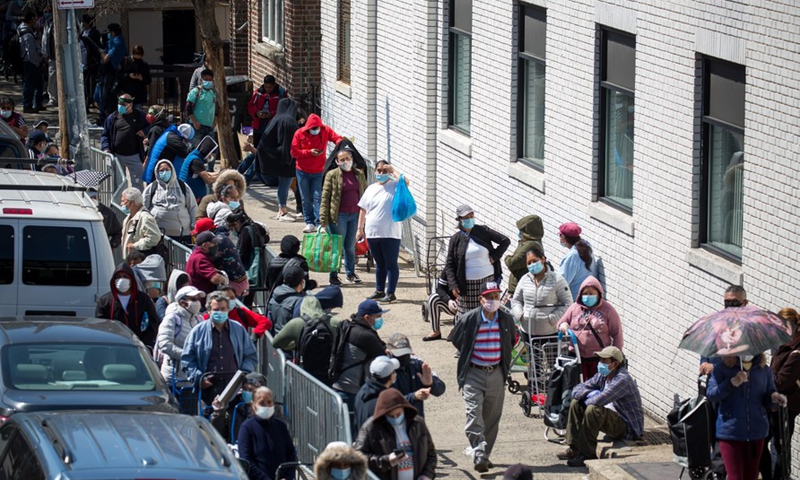US food banks see overwhelming community support amid COVID-19 pandemic
Source: Xinhua Published: 2020/12/15 14:31:24

People line up outside a food pantry in Brooklyn, New York, United States, Nov. 12, 2020. (Photo by Michael Nagle/Xinhua)
Kara Ross, president and CEO of Food Bank of Eastern Michigan, said the COVID-19 pandemic has hit the local economy hard.
"Lots of people here have service industry jobs like restaurants or hotels or tourism. Even if they're employed, their hours have been cut," Ross told Xinhua.
With a surge of people struggling to make ends meet, the area's food insecurity rate has skyrocketed to 40 percent, from a pre-pandemic 14 percent, Ross said.
The situation mirrors that of communities nationwide, as government-imposed lockdowns and draconian restrictions have sparked high jobless rates not seen since the massive recession that followed the 2007-2008 economic meltdown.
But if a silver lining is to be found, it's that local businesses and ordinary people nationwide have stepped up in droves to donate to food banks.
"Our community and donors are very generous," Ross said.
"It's rewarding to see neighbors helping neighbors," she said, adding that the majority of her organization's funding comes from donations from individuals and local businesses.
Ross' organization is now distributing around 1 million pounds of food -- double that amount it usually handles, she said.

A chef carries milk donated by Bethel Creamery at a food distribution site in the Brooklyn borough of New York, United States, May 14, 2020. (Photo by Michael Nagle/Xinhua)
That underscores that vital role that U.S. food banks, many of which run on a combination of individual and local business donations, as well as federal, state and local aid, are playing in communities nationwide.
According to Feeding America, a non-profit network of over 200 food banks, food banks provided 4 billion meals to Americans between March and October.
Elizabeth Gilkey, communications manager of a regional food bank outside of Washington, D.C., said her organization is distributing around 70 percent more food than before the pandemic hit.
That comes from a surge of donations from individuals, local grocery stores and other local businesses.
"We've had incredible community support," Gilkey told Xinhua.
"That is one of the most amazing things about Americans. When bad things happen, people step up and help," Gilkey said.
The food bank where Gilkey works does not receive government assistance other than commodities, and all donations come from individuals and businesses, Gilkey said.
Ellen Thornhill, a consultant at Feed More, a food bank that serves over 30 cities and counties in central Virginia, said, "I feel that I am doing something that is helping to make a difference."
"It's pretty unprecedented, the number of people impacted by the pandemic," Thornhill told Xinhua, noting that her organization has seen a 30 to 60 percent increase in traffic at food pantries.

People wait to receive food at a food distribution site in the Brooklyn borough of New York, the United States, May 14, 2020. (Photo by Michael Nagle/Xinhua)
From the beginning of March through the end of October, food banks nationwide distributed an estimated 4.2 billion meals to people facing hunger in the United States, according to Feeding America's website.
More than 80 percent of the nation's food banks are serving more people now than they did a year ago. In October alone, food banks distributed 50 percent more food than they did last year at the same time, Feeding America's website said.
U.S. corporations are also pitching in. Tech giant Amazon recently announced a 100-million-U.S.-dollar donation to Feeding America's network of food banks.
Corporate partners of Feeding America also include Aeropostale, American Express, Hidden Valley Ranch, Kiehl's, Starbucks, T.J.Maxx, Marshalls, HomeGoods, Sierra & Homesense, and Whole Foods Market.
Coffee shop chain Starbucks recently announced that for every bag of Christmas Blend or Decaf Christmas Blend coffee purchased at participating U.S. Starbucks locations between Dec. 10 and Dec. 11, the company would donate the equivalent of 10 meals to Feeding America.
Around nine months after the pandemic hit the United States, there is light at the end of the tunnel.
Mass distribution of a COVID-19 vaccine is now underway after the U.S. Food and Drug Administration authorized it for emergency use.
Still, it remains unknown how much economic damage the lockdowns and business restrictions have done, as scores of small companies have gone out of business.
It remains unclear how many laid off Americans will have no company to go back to once the vaccine is widely available, as there have been an estimated 100,000 permanent small business closures.
At the same time, critics said Washington is dragging its feet on a stimulus bill.
Posted in: AMERICAS